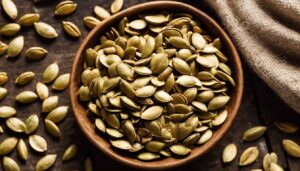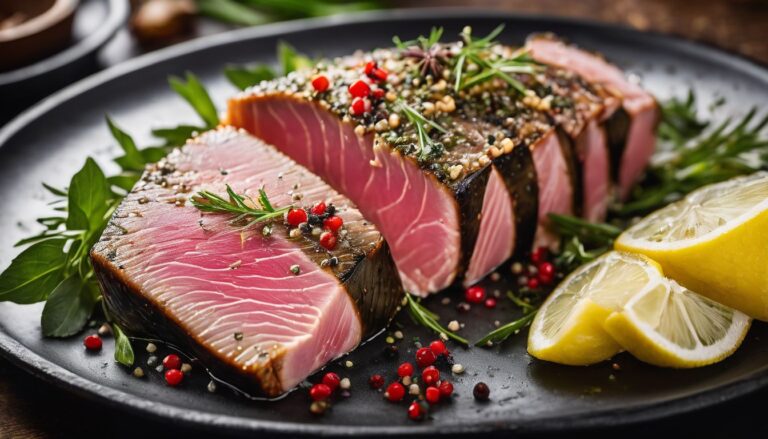Is Beef A Good Source Of Protein? Unpacking The Nutritional Benefits You Need To Know
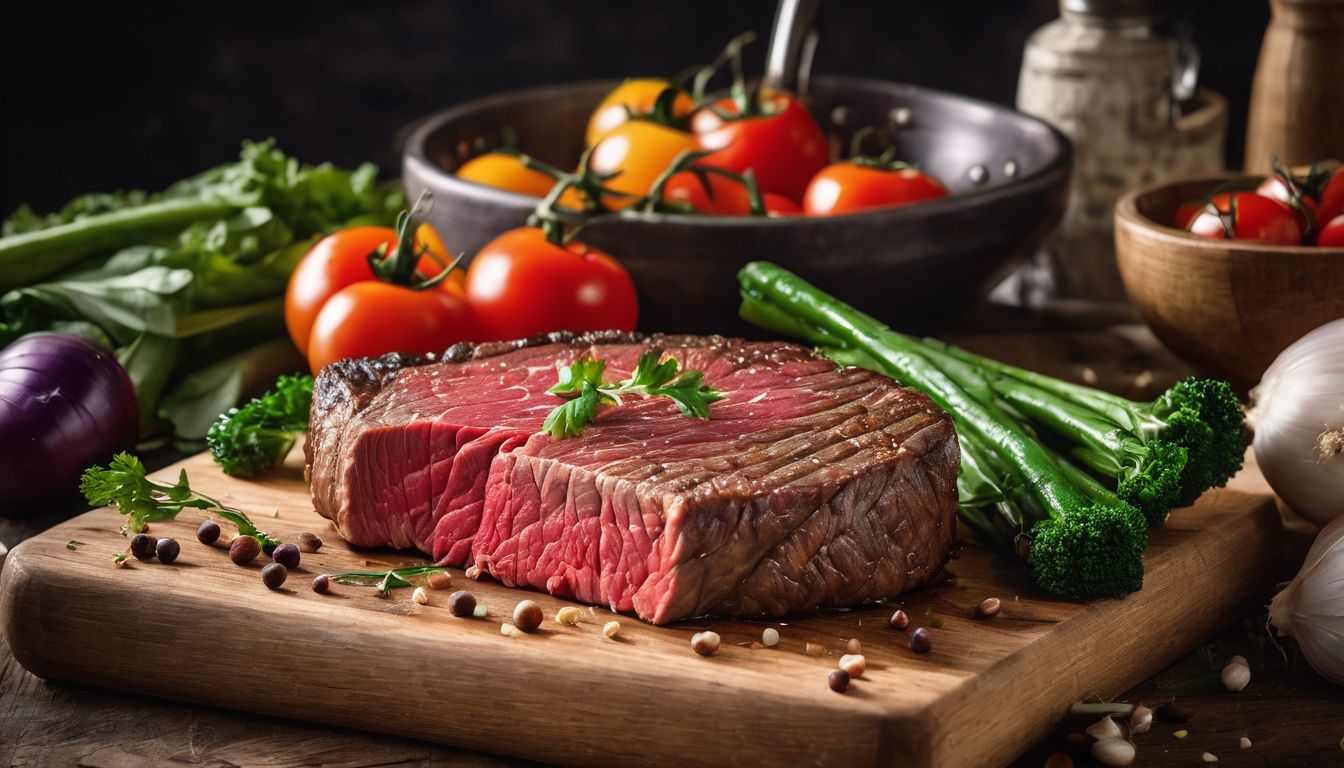
In the quest for a healthy diet, red meat often gets a bad rap, conjuring images of fat-laden steaks and concerns about cholesterol levels. But let’s slice through the noise and dive into what science says about beef as a protein powerhouse.
With my decade-long experience as a nutritionist, I’ve dissected countless food compositions to truly understand their impact on our health.
Beef boasts not only high-quality protein but also an impressive array of essential nutrients beneficial for everything from building muscle to preventing iron deficiency. A 3-ounce serving of lean beef packs roughly 25 grams of protein – that’s more than half of your daily recommended intake! Stick around; this is just the appetizer.
The main course awaits with juicy details that may reshape how you view your next burger or steak night. Ready to dig in?.
Key Takeaways
- Beef is a substantial source of high – quality protein, providing all nine essential amino acids necessary for muscle repair and growth.
- It contains vital nutrients like iron, zinc, B vitamins, and selenium critical for muscle health, immune function, anemia prevention, and overall well-being.
- While beef consumption should be moderated due to its saturated fat content and potential link to certain cancers when overconsumed or improperly prepared, it can still be included in a balanced diet alongside leaner protein sources.
- The nutritional benefits of beef make it a practical choice for individuals aiming to maintain muscle mass and enhance exercise performance.
Beef Nutrition Facts and Health Effects

Beef is a rich source of high-quality protein, essential vitamins like B12, and minerals such as iron and zinc. It also contains beneficial compounds like conjugated linoleic acid and l-carnitine that can contribute to overall health.
Protein content

Beef packs a powerful protein punch that can help support muscle mass and overall health. A typical 3-ounce serving of lean beef contains about 25 grams of high-quality protein, which is essential for repairing tissues and building muscles.
Unlike some other sources, the protein in beef is complete, providing all nine essential amino acids your body needs to function at its best.
For those keeping an eye on weight management or involved in sports training, the rich protein content of beef makes it a valuable part of a nutritious diet. It’s not just about quantity; the quality matters too.
Protein from beef is highly bioavailable, meaning your body can easily absorb and utilize it. This makes beef an excellent choice for anyone looking to maintain or increase their muscle mass while providing a feeling of fullness that can aid in weight loss efforts.
Vitamins and minerals
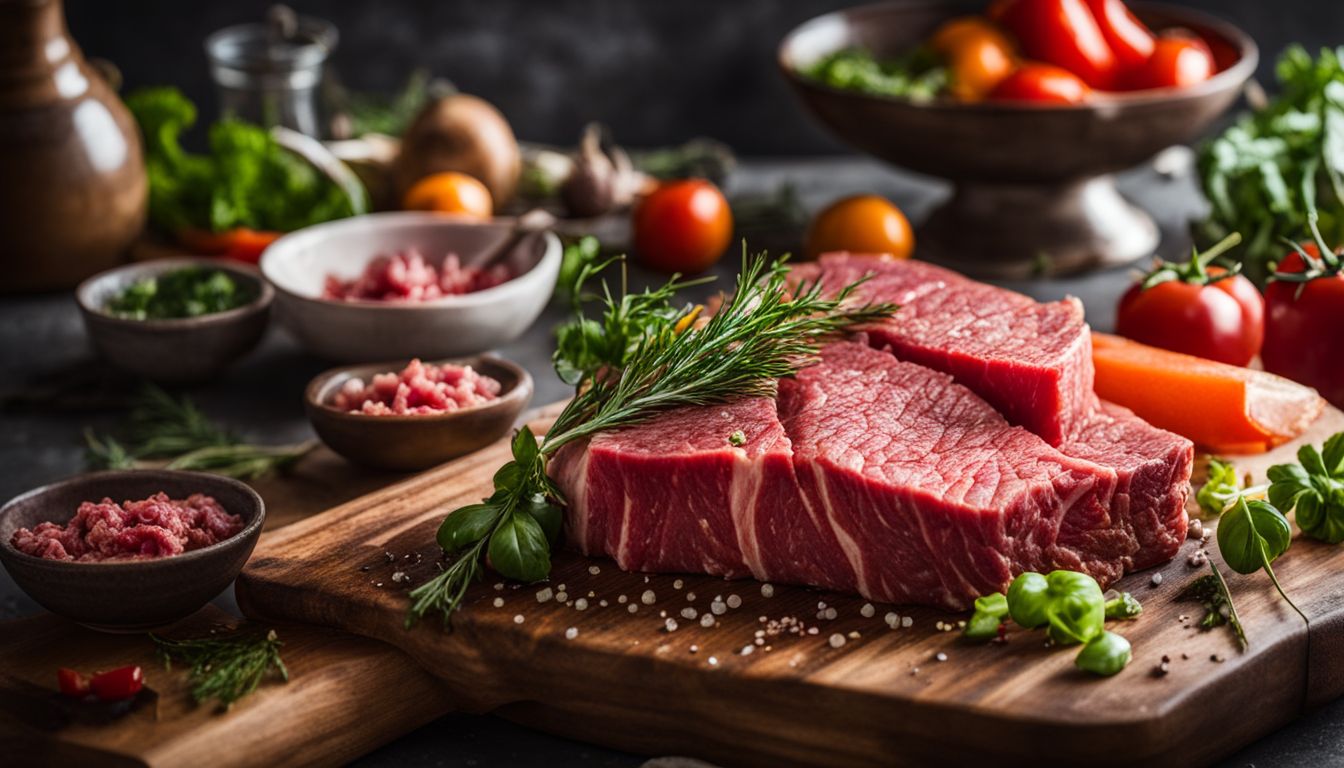
Beef packs a powerful punch of vitamins and minerals that are essential to our health. From promoting brain function to strengthening bones, it’s a nutrition powerhouse.
- Rich in B Vitamins: Beef is an excellent source of B vitamins, particularly vitamin B12, which is crucial for nerve function and the production of DNA and red blood cells. It’s hard to get enough vitamin B12 from plant-based foods alone, making beef an important component of a balanced diet.
- Iron Clad Benefits: Iron comes in two forms in our diet – heme and non-heme iron. Beef contains heme iron, which is more readily absorbed by the body compared to non-heme iron found in plant foods. This makes it a valuable food for preventing anemia.
- Zinc for Immune Defense: Zinc plays a vital role in immune system functions and wound healing. Just one serving of beef can provide a significant portion of your daily zinc requirement.
- Selenium Support: Acting as an antioxidant that defends against cell damage, selenium in beef helps protect your body from oxidative stress and supports thyroid health.
- Ample Supply of Phosphorus: Responsible for the formation of bones and teeth, phosphorus also aids in filtering out waste in the kidneys—a mineral provided abundantly by beef.
- Magnesium Matters: Beef contains magnesium which is key for muscle function and energy production throughout the body.
Other beneficial compounds

Beyond its well-known protein punch, beef offers a treasure trove of other compounds pivotal to our health. It’s rich in essential minerals like zinc, which bolsters the immune system, and selenium known for protecting cells from damage.
These minerals are key players in maintaining overall wellbeing and are readily absorbed from meat sources compared to plant-based alternatives.
Another star component found in this versatile meat is iron, particularly heme iron which is far more accessible to the body than the non-heme variety found in plant foods. This form of iron is crucial for making hemoglobin that carries oxygen through our blood.
Consuming enough through diet can help prevent anemia—a common concern especially among women and children. Beef also contains trace elements such as magnesium that supports muscle and nerve function, highlighting its role as more than just a protein supplier but a multifaceted nutritional powerhouse.
Health Benefits of Beef
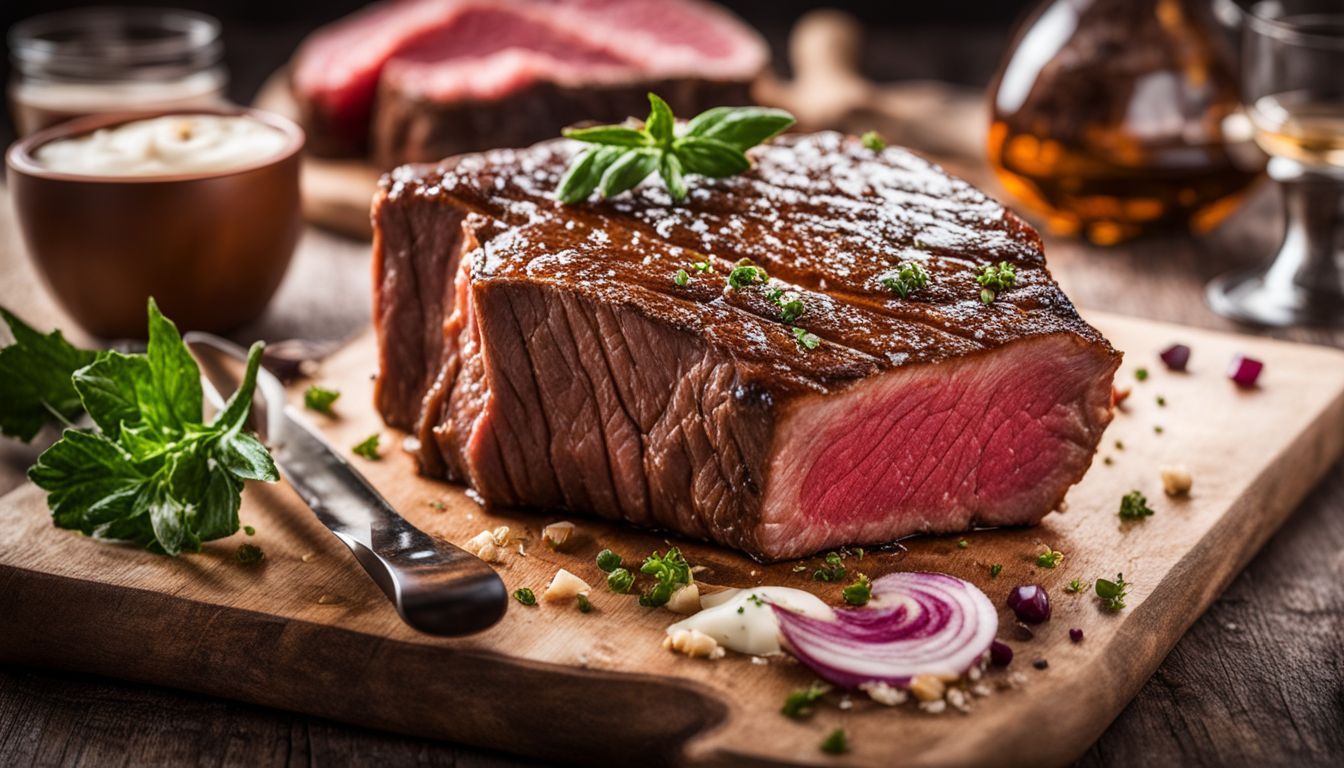
Beef provides essential nutrients like iron and zinc which are important for maintaining muscle mass and overall health.
Maintaining muscle mass
Beef is a crucial component of a protein-rich diet, playing a vital role in maintaining muscle mass. The high-quality protein found in beef contains essential amino acids necessary for muscle growth and repair.
This supports individuals who engage in regular exercise or physical activity by helping them maintain and develop lean muscle mass. Incorporating beef into a balanced diet can contribute to overall muscle health and strength.
Consuming beef as part of a well-rounded meal plan can help ensure the body receives an adequate supply of protein necessary for retaining and building strong muscles. Protein from beef facilitates the repair and maintenance of tissues, including muscles, which is especially beneficial for those looking to improve their physical fitness or recover from intense workouts.
Improved exercise performance

Beef can contribute to improved exercise performance due to its high-quality protein content, which supports muscle repair and growth after workouts. The amino acids in beef are essential for maintaining and developing muscle mass, aiding in post-workout recovery, and enhancing overall athletic performance.
Athletes can benefit from incorporating lean beef into their diets as part of a balanced nutrition plan to help them achieve their fitness goals.
In addition to being an excellent source of protein, beef also provides essential nutrients such as iron and B vitamins that play a crucial role in oxygen transportation within the body during physical activity.
Anemia prevention

Beef is a rich source of heme iron, which plays a crucial role in preventing anemia. Heme iron is easily absorbed by the body and aids in the production of hemoglobin, essential for carrying oxygen to cells and tissues.
This makes beef an important dietary choice for individuals at risk of or suffering from anemia as it helps maintain healthy levels of red blood cells.
Consuming lean cuts of beef can also contribute to preventing anemia as it provides high-quality protein and essential nutrients such as vitamin B12 and folate, both critical in red blood cell formation.
Concerns Surrounding Beef Consumption

Consumers should be aware of potential risks associated with high consumption of saturated fat and the possible link to certain types of cancer. To learn more about these concerns surrounding beef consumption, keep reading for a balanced perspective on the topic.
Saturated fat and heart disease

Saturated fat is a type of dietary fat that has been linked to an increased risk of heart disease. When consumed in excess, saturated fats can raise levels of LDL cholesterol in the blood, which is considered a major risk factor for heart disease.
Red meat, including beef, is known to be relatively high in saturated fats compared to other protein sources like poultry or fish.
Consuming high amounts of red meat with its associated saturated fat content may contribute to an increased risk of developing heart disease over time. This does not mean that one must completely avoid beef, but rather it should be consumed in moderation as part of a balanced diet alongside leaner protein sources and plenty of fruits and vegetables.
Possible link to cancer
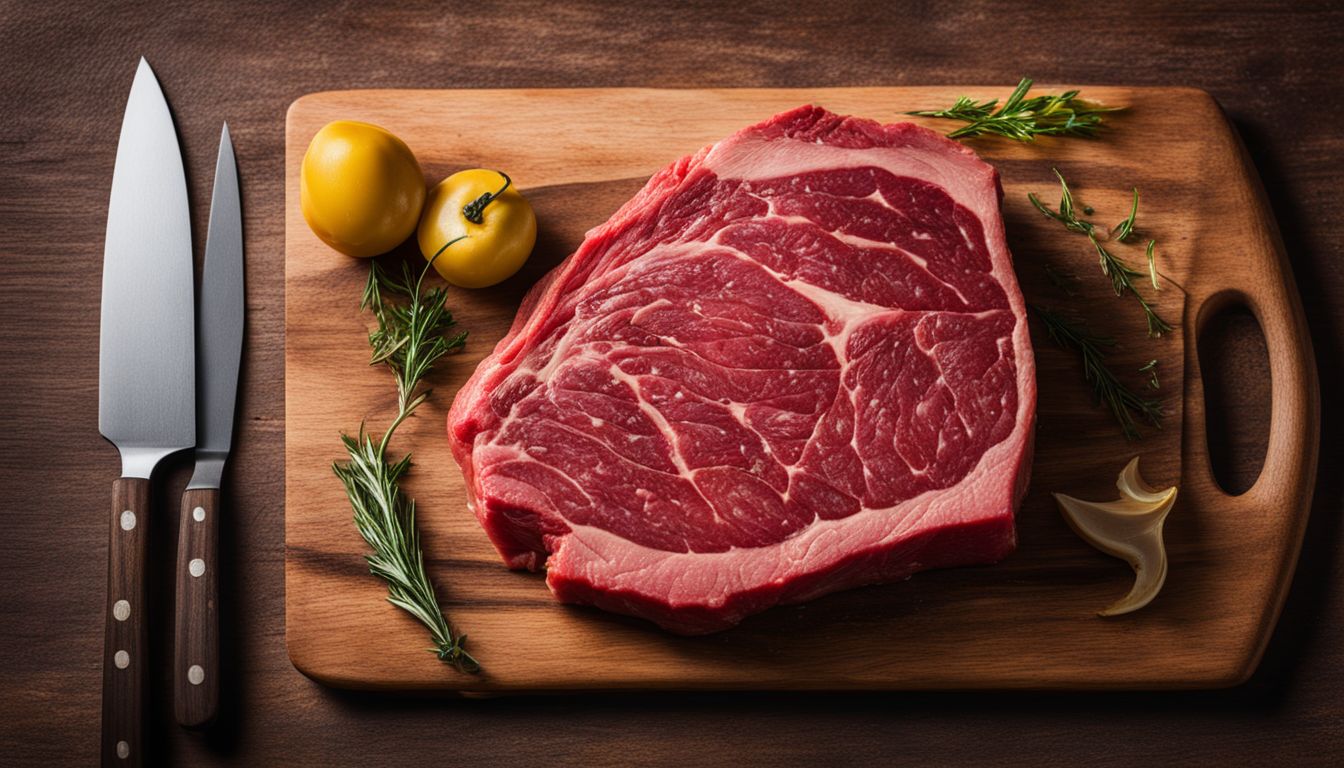
Studies have suggested a potential connection between high consumption of red and processed meats, such as beef, and an increased risk of certain types of cancer. Research has shown that compounds formed during the cooking process, such as heterocyclic amines and polycyclic aromatic hydrocarbons, may be carcinogenic.
Furthermore, processed meats contain nitrates that can form nitrosamines in the body, which are also linked to cancer development. It’s important to note that while these associations exist, more research is needed to fully understand the specific mechanisms at play.
Cooking methods can also impact the potential link between beef consumption and cancer. For instance, grilling or broiling meat at high temperatures can lead to the formation of harmful substances.
Risks of eating undercooked beef
Eating undercooked beef poses significant health risks. Consuming beef that is not properly cooked can lead to foodborne illnesses caused by harmful bacteria such as E. coli, Salmonella, and Listeria.
These pathogens can cause symptoms like severe stomach cramps, diarrhea, vomiting, and in some cases, even more serious complications like kidney failure or pregnancy-related problems.
Consuming undercooked beef also increases the risk of contracting parasitic infections such as tapeworms. This can lead to a condition known as taeniasis, which causes symptoms like nausea, weakness, abdominal pain, and unintended weight loss.
Beef as a Source of Protein for Sports Training

Beef provides essential amino acids for muscle development and enough protein for post-workout recovery, making it a valuable source of protein for athletes. For those who do not eat beef, there are alternative sources available to meet their dietary needs.
Essential amino acids for muscle development
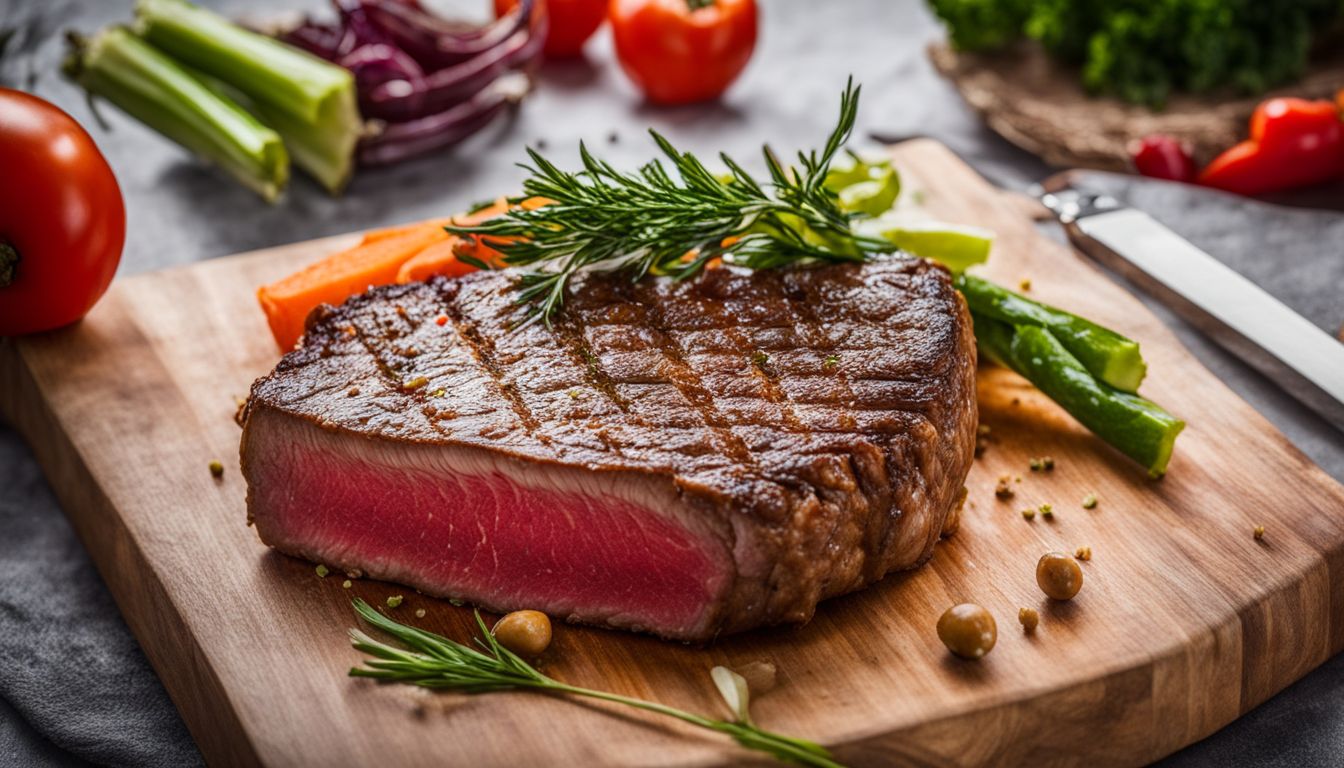 Essential amino acids are crucial for muscle development, and beef is a rich source of these vital nutrients. Leucine, one of the essential amino acids found in beef, plays a significant role in stimulating muscle protein synthesis.
Essential amino acids are crucial for muscle development, and beef is a rich source of these vital nutrients. Leucine, one of the essential amino acids found in beef, plays a significant role in stimulating muscle protein synthesis.
This process is essential for building and repairing muscle tissue after exercise.
Beef also contains other key amino acids like valine and isoleucine, which promote energy production during workouts while supporting muscle recovery. These valuable components make beef an important dietary choice for individuals looking to enhance their muscle development and overall athletic performance.
Sufficient protein for post-workout recovery
Beef serves as an excellent source of protein for post-workout recovery. The high-quality protein found in beef contains essential amino acids that aid in muscle repair and growth after exercise.
Consuming beef as part of a balanced post-workout meal helps replenish energy stores, supports muscle recovery, and promotes overall strength and endurance. Athletes and fitness enthusiasts who include beef in their diet can benefit from its rich protein content to optimize their post-exercise recovery process.
Furthermore, the complete protein profile of beef provides all the necessary building blocks for repairing and strengthening muscles, making it a valuable component in a post-workout nutrition plan.
Alternative sources for athletes who do not eat beef
Athletes who do not eat beef can still obtain sufficient protein from various alternative sources. These include:
- Poultry: Chicken and turkey are excellent sources of lean protein, providing essential amino acids for muscle development and post-workout recovery.
- Fish: Salmon, tuna, and other fish offer high-quality protein with the added benefit of omega-3 fatty acids, which aid in reducing inflammation and supporting overall health.
- Eggs: A complete source of protein, eggs contain all essential amino acids necessary for muscle repair and growth.
- Dairy products: Milk, yogurt, and cheese deliver a combination of protein, calcium, and other essential nutrients crucial for muscle function and recovery.
- Plant-based proteins: Legumes, tofu, tempeh, quinoa, chia seeds, and hemp seeds are valuable alternatives that provide quality protein while offering additional fiber and beneficial plant compounds.
- Protein supplements: Whey, casein, soy, or pea protein powders can be used to supplement dietary intake to meet the increased demands of athletes engaged in intense training.
- Nuts and seeds: Almonds, peanuts, pumpkin seeds, and sunflower seeds are rich in protein as well as healthy fats that contribute to sustained energy levels during training sessions.
Conclusion

Beef is a rich source of protein and essential nutrients, making it a valuable addition to a balanced diet. Its role in maintaining muscle mass and promoting exercise performance underscores its practicality for active individuals.
By considering the health benefits alongside potential concerns, readers can make informed decisions about including beef in their diets. Emphasizing the impact of these strategies on overall health highlights the importance of understanding the nutritional value of beef.
Take action today by exploring nutritious recipes that incorporate lean beef, embracing its potential to enhance your well-being and fitness journey.
FAQs
1. Is beef a healthy protein choice?
Yes, beef is a good source of protein and provides essential amino acids that are important for our muscles.
2. What are the health risks of eating too much beef?
Eating lots of red meat like beef can increase your total cholesterol and may raise the risk for cardiovascular disease or type 2 diabetes.
3. Can switching to grass-fed beef make a difference in my diet?
Grass-fed beef often has more nutrients and less fat than grain-fed beef, making it better for those on low-fat diets or anyone looking at their heart health.
4. Are there any benefits to eating ground beef instead of other types?
Lean ground beef is full of proteins and iron but should be eaten moderately as part of a balanced diet including whole grains and vegetables.
5. How does consuming red meats impact things beyond my health?
Producing large amounts of red meats can affect the health of the planet, so choosing sustainable options or reducing consumption can help.
6. What should I know about cooking methods for meat regarding nutrition?
Broiling or grilling lean cuts like lean meat reduces added fats compared with frying; also avoid processed forms such as beef jerky which may contain harmful additives.

Author
Years ago, the spark of my life’s passion ignited in my mind the moment I stepped into the local gym for the first time. The inaugural bead of perspiration, the initial endeavor, the very first surge of endorphins, and a sense of pride that washed over me post-workout marked the beginning of my deep-seated interest in strength sports, fitness, and sports nutrition. This very curiosity blossomed rapidly into a profound fascination, propelling me to earn a Master’s degree in Physical Education from the Academy of Physical Education in Krakow, followed by a Sports Manager diploma from the Jagiellonian University. My journey of growth led me to gain more specialized qualifications, such as being a certified personal trainer with a focus on sports dietetics, a lifeguard, and an instructor for wellness and corrective gymnastics. Theoretical knowledge paired seamlessly with practical experience, reinforcing my belief that the transformation of individuals under my guidance was also a reflection of my personal growth. This belief holds true even today. Each day, I strive to push the boundaries and explore new realms. These realms gently elevate me to greater heights. The unique combination of passion for my field and the continuous quest for growth fuels my drive to break new ground.



